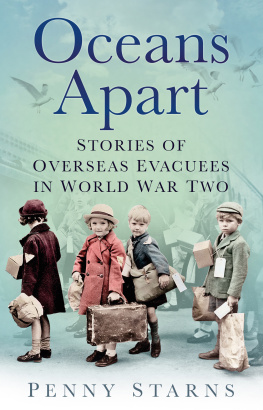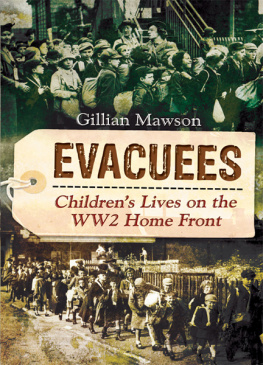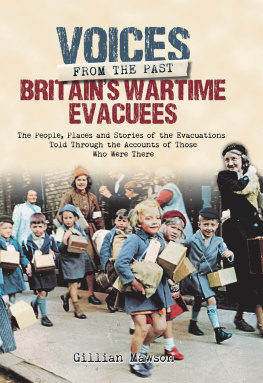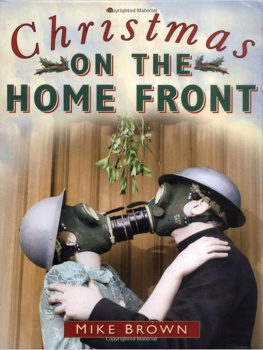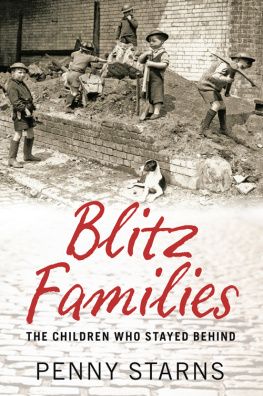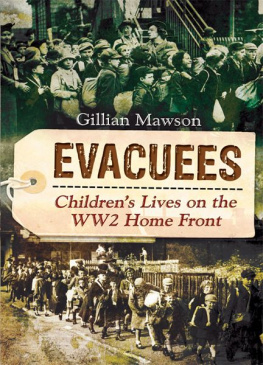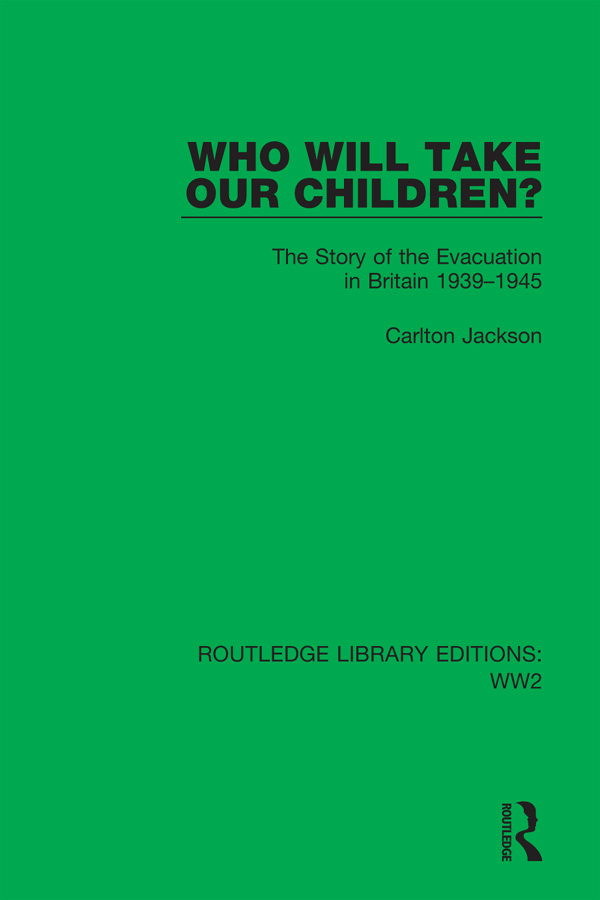
ROUTLEDGE LIBRARY EDITIONS: WW2
Volume 46
WHO WILL TAKE OUR CHILDREN?
First published in 1985 by Methuen
This edition first published in 2022
by Routledge
2 Park Square, Milton Park, Abingdon, Oxon OX14 4RN
and by Routledge
605 Third Avenue, New York, NY 10158
Routledge is an imprint of the Taylor & Francis Group, an informa business
1985 Carlton Jackson
All rights reserved. No part of this book may be reprinted or reproduced or utilised in any form or by any electronic, mechanical, or other means, now known or hereafter invented, including photocopying and recording, or in any information storage or retrieval system, without permission in writing from the publishers.
Trademark notice: Product or corporate names may be trademarks or registered trademarks, and are used only for identification and explanation without intent to infringe.
British Library Cataloguing in Publication Data
A catalogue record for this book is available from the British Library
ISBN: 978-1-03-201217-9 (Set)
ISBN: 978-1-00-319367-8 (Set) (ebk)
ISBN: 978-1-03-208070-3 (Volume 46) (hbk)
ISBN: 978-1-03-208076-5 (Volume 46) (pbk)
ISBN: 978-1-00-321282-9 (Volume 46) (ebk)
DOI: 10.4324/9781003212829
Publishers Note
The publisher has gone to great lengths to ensure the quality of this reprint but points out that some imperfections in the original copies may be apparent.
Disclaimer
The publisher has made every effort to trace copyright holders and would welcome correspondence from those they have been unable to trace.
First published in Great Britain 1985
by Methuen London Ltd
11 New Fetter Lane, London EC4P 4EE
Copyright 1985 Carlton Jackson
Phototypeset by
Wyvern Typesetting Ltd,
Bristol
Reproduced, printed and bound in Great Britain by
Hazell Watson & Viney Limited,
Member of the BPCC Group,
Aylesbury, Bucks
British Library Cataloguing in Publication Data
Jackson, Carlton
Who will take our children?
I. World War, 19391945Evacuation of
civilians 2. ChildrenGreat Britain
History20th century
I. Title
940.53'161'0941 D809.G7
ISBN 0-413-58130-6
To my English wife, Pat
List of Illustrations
Acknowledgments and thanks are due to the BBC Hulton Picture Library for plates .
Acknowledgments
In 1980, some new material became available at the Public Records Office in Kew, particularly concerning the Childrens Overseas Reception Board. (These collections had apparently been stored in an obscure corner of the Dominions Office before going to the PRO.) After the war, many of the CORB records were destroyed (twenty-seven bags, each weighing fifty-five pounds), but enough were saved to enable me to add an international dimension to my study, an aspect I had not envisioned when I first started the project. With regard to the CORB records, I believe I am, as one of the PRO assistants said, the only serious researcher-writer to see them since they were first written during the war. Whatever the case, the records at the PRO were indispensable to my study.
Another extremely important source for my work was the Tom Harrisson Archive at Sussex University. These unique collections started in the late 1930s, when Harrisson and some colleagues hit upon the idea of conducting a massive investigation into all aspects of British social life. Their object was to hire interviewers to talk to people anywhere they were found, and record their observations of the world in which they lived. The result is massive collections in the Archive which chronicle societal opinions on subjects ranging from aims in life to wall chalkings and war graffiti. One of the Archives latest collections deals with the recent conflict between Britain and Argentina over the Falkland Islands.
Many people helped with my research and writing but to the staffs of the PRO and the Harrisson Mass Observation Archive go my deepest gratitude. It was a pleasure to work with such dedicated people.
While I did use several letters, notebooks, and diaries of the evacuees, written while they were evacuees, my interviews of them today have to take into account the passage of time. Frequently, time will sharpen an image; and from the tone of their conversations, and the pictures they conjure up, that is exactly what has happened to those people who were evacuees during World War II. I wish to thank all the former evacuees who have helped me, whether it was in a Kew Gardens pub or by writing to me. Their experiences were essential to my understanding of the subject.
At my University, Western Kentucky, I was helped by a sabbatical during the 1980-1 school year, and by grants from the Faculty Research Committee. To members of the sabbatical and research committees, thank you. My friends and colleagues, Carol Crowe-Carraco, Drew Harrington, and Lowell Harrison, read all or parts of the manuscript, and gave numerous useful suggestions. My student assistants, Bruce Trammell and Charles Januzzi, helped in uncountable ways.
I thank also my family: Beverly, Steve, Colleen, Patrick; Dan, Grace, Travis, Megan, Austin; Hilary; Matthew; and Pat, for their continued forebearance.
Western Kentucky University Carlton Jackson
Foreword
When I first went to England, I was eighteen years old, stationed at Upper Heyford Air Force Base in Oxfordshire. Nearby, in the little village of Kirtlington, was a pub, The Dashwood Arms. Soon after I began patronizing The Dash, I learned that I was not the only foreigner there. Many Londoners and continental refugees had come to Kirtlington during the Second World War, and simply decided to stay when the conflict ended. Though there were fewer animosities in 1951 between the outsiders and the native-born than while the war was in progress, these people would always be known as the vacs.
Many of the vacs became my friends in 1951 and now, over thirty years later, I am proud to say that they still are. On each successive visit back to England (now over a dozen), I was impressed anew with the thought of writing an orderly, scholarly account of the evacuation, and how it affected life in Britain. That is my purpose with this book. I wish to direct it towards an audience who know and appreciate British values and experiences. My study is descriptive, for the most part, with analyses of social changes interspersed throughout.
To be sure, there had been prior evacuations in England. One thinks, for example, of the great Puritan exodus in the early seventeenth century and flights from the big cities during the plague year of 1666. Also, there had been periodic migrations to Britains Commonwealth countries, frequently to allay the circumstances of overpopulation in the Mother Country itself.
None of these previous occurrences, however, was any kind of precedent for what happened in 1939, 1940, and 1941. Technology caused domestic evacuations in World War II to be different from anything that had gone before. At no time in their history were the big English cities so vulnerable to attacks from the air. This fact provided the impetus for large-scale evacuations, especially of children, and of others who were not directly connected with the war effort. Long distance trains and buses could take the evacuees to the farthest reaches of the British Isles, permeating every household, as it were, with strange people, both in language and ways. World War II evacuation produced a homogenization of British life, the likes of which had never been seen before. The mixing of classes and the intrusion of one standard of life upon another had profound social and economic effects on life in Britain; evacuation led to some rather large-scale postwar social rearrangements. I mention and discuss those rearrangements generally throughout the text and endnotes, and specifically in the epilogue.
Next page

